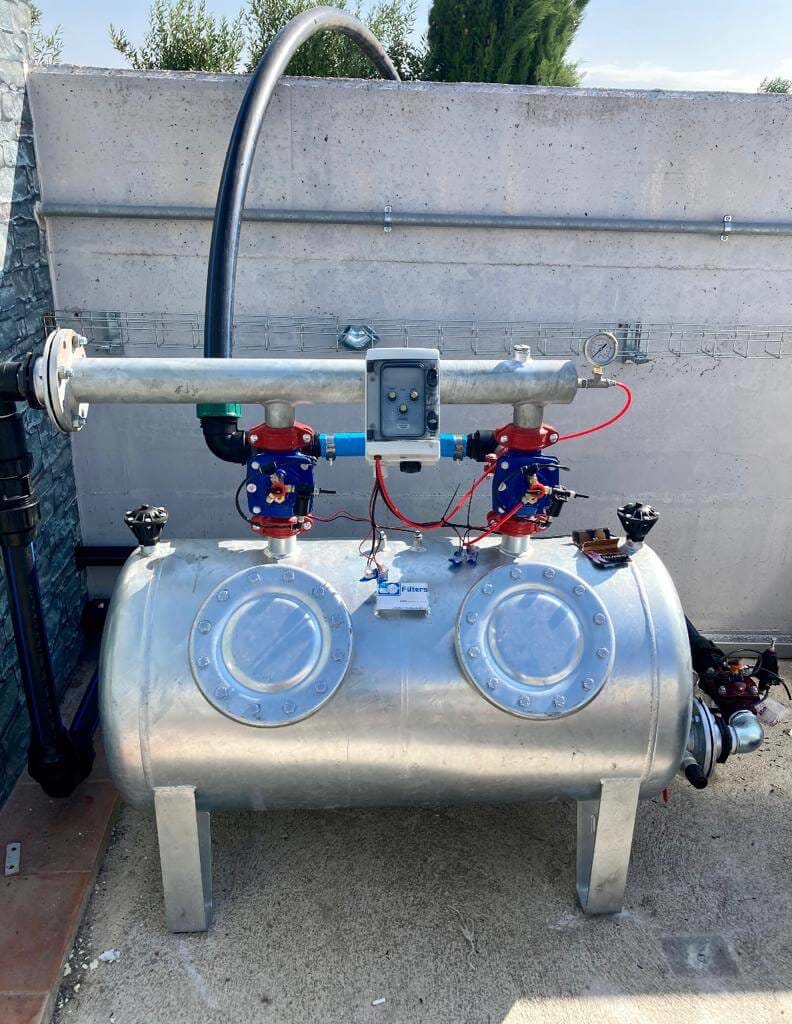A tough challenge today. Same function, clean water. Whether we are talking about manual or automatic filtering systems, the goal is the same: to preserve our irrigation system from small and large impurities that could block the irrigation system.
From an economic point of view, an automatic filter implies higher costs than a manually cleaned filter, but if we consider the advantages inherent in an automatic filter, that difference in cost will be compensated by the improved efficiency of the filter performance.
Specifically, self-cleaning filters are divided into two categories, mesh filters and grit filters, both perform a wash whenever the filter is filled with impurities such as to reduce or even obstruct the passage of water.
The working concept of an automatic filter is simple. It "reads" the pressure difference between the filter inlet and outlet (as is done through the pressure gauges in the manual filter) and starts a wash until the filter is brought back to optimal working conditions. This process allows you to obtain two advantages. First of all, don't run the risk that impurities could end up blocking the drippers of our system, but above all it allows you to reduce the maintenance of the filters themselves.
Let's help ourselves with an example to better understand the advantages of the automatic filter.
If we consider a manually washed grit filter that works in rather dirty waters as the supply source is a channel full of algae, this filter will need to be cleaned much more, to prevent it from clogging.
As known, the process of cleaning the water inside a grit filter takes place through the quartzite (grits) present inside it, which blocks the impurities and allows clean water to flow out. Therefore, if the filter worked, as in this case, in the presence of many impurities, the grit present inside it would be subject to greater wear and consequently would even need to be replaced every year. In many cases, the filter continues to be used with unsuitable grit and therefore filtering is reduced, allowing the passage of particles which will then block the irrigation system.
Having said that, let's imagine working with an automatic filter, under the same conditions mentioned above. We will notice how the cleaning of the filter will take place every time the sensors sense a pressure difference between the inlet and outlet, reducing the wear of the quartzite inside and consequently the risk of occlusion of the drippers will be almost zero. Furthermore, with an automatic washing filter, another aspect to consider in addition to the lesser maintenance of the filter itself, is time. The time to be devoted to cleaning the filter which in the case of large quantities of impurities present in the water can be very high and which could be exploited and saved in other ways.
As we have seen, the advantage in economic terms is given by the less wear of the grit which can therefore be replaced with a higher frequency of time, and furthermore there will be a lower risk of occlusion of the drippers which will have a longer life cycle and therefore a lower probability of being replaced in a short period of time.
It remains clear that a filter, whether automatic or manual, must always be sized according to the flow rate of your system. A system that will have a small size filter (for example 2") and inside which large quantities of water will pass (for example 10lt/s) will have reduced cleaning times especially in the presence of more or less high quantities of impurities beyond than a high pressure drop due to the small size of the filter.
Having said that and considered in this article, we could say that in choosing the filtering system to use for your irrigation system you must first take into account the type of impurities present in the water, which will determine the choice of the type of filter to be used, whether mesh, disc or grit, and then you will have to understand the water flow rate of your irrigation system, which will determine the choice of filter size and finally the possibility of installing an automatic filtering system.
Good choice ;-)

